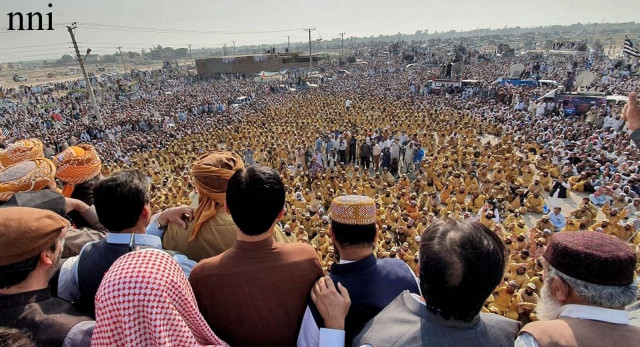How would the Azadi March play out?
The govt and accountability organisations have to justify their actions to earn the confidence, goodwill of the people

How would the Azadi March play out?
For the PML-N and the PPP, which have their own set of grievances for the treatment meted out to them by the ruling party, the JUI-F provides a convenient platform for destabilising and prematurely removing the government.
What are the implications of this gathering political storm, how will it unfold and is there a way out to find a peaceful and productive solution?
There is no denying that Pakistan’s state of democracy is very fragile. The military, judiciary and bureaucracy wield far more power and influence in formulation and implementation of domestic and foreign policies than would be expected in a normal democratic country. Even a cursory glance at the present situation would reveal that the economic management is virtually controlled by the IMF through international and Pakistani technocrats. The economy is likely to stay in intensive care for a year or two at least. Relations with India are passing through the worst crisis and Modi, to divert attention from Kashmir, is using every means to destabilise Pakistan and falsely blaming it for promoting terrorism in Kashmir. There is no likelihood of any change in India’s attitude in the near term; it could get worse.
The situation in Afghanistan is highly unpredictable with several chaotic scenarios that could play out as differences amongst the Taliban and the government and various political entities remain wide. The consequences of it on our western border and the heavy influx of refugees would be an added burden. Relations with India and Afghanistan — that essentially revolve around security issues — are unlikely to change.
Clearly, the most pertinent point is: will the Azadi movement strengthen democracy or provide state institutions more space and influence especially if it takes an ugly turn? The irony is that PM Imran Khan is more comfortable in leaning towards state institutions rather than drawing strength from Parliament and political forces. This has been his style of governance and now with the opposition’s Azadi March, the government’s dependence on security forces will be even more. The government would rather shut down several arteries leading to the Red Zone by placing roadblocks and a heavy contingent of security forces than take a chance.
The emerging political uncertainty justifiably increases the concerns of the military. They have been very discreet and advising all parties to exercise restraint, and perhaps on their advice the JUI-F leadership agreed to change the main venue of protest.
The international community is watching the developments closely. Their interests and concerns are multiple; for them an unstable and chaotic Pakistan could be a nightmare for the region. Severe political unrest would certainly hit prospects of investment. It could also encourage the TTP and other militant factions to take advantage of the situation.
There is a significant cross-section of people who are unsure whether the opposition is a better alternative in the present circumstances. No doubt, the PML-N and the PPP have experienced and dedicated second tier leadership, but are they in a position to fare any better?
During the sit-in protest, the opposition should come out with their plan of dealing with the multiple crises that the country is facing. Finding faults with the government is certainly the right of the opposition but it has to be accompanied with an alternative strategy. They have to inspire the confidence of the electorate that they are better qualified to lead the country at a time when the economy, political structure and institutions are struggling. It would have been far better if their dissent were effectively expressed in Parliament rather than on the streets. Do they not realise that Pakistan is hanging on to democracy with a fig leaf, and chaos is not what it needs to cover itself? Does it also not affect the ego of major political parties that instead of being in the lead, they have become the followers of a regional political party? Moreover, the downtrodden people of Pakistan would be more interested in listening to what concrete measures the opposition has on improving governance and giving these teeming faceless millions other than promises that regrettably seldom materialise. And what hope and credible assurance they can give that the protest this time would be any different, other than adding to their miseries.
The government, from its side, should ensure that political victimization — intended or perceived — should stop as it drives the opposition toward desperate measures and gives the country a bad image at a time when it desperately needs goodwill of the international community. By now, we as a nation should have learnt that reputation and standing as a responsible state are what investors are looking for. Besides, the PTI has to convince the electorate by words and deeds that it is serious about Naya Pakistan. This can only happen if the political landscape changes from the nasty politics of today. There is no reason why some eminent opposition politicians who have an unblemished record are held without trial for prolonged periods giving an impression of victimisation. The political government and accountability organisations have to justify these actions to earn the confidence and goodwill of the people. Nothing would add to Pakistan’s reputation and self-esteem more if its leaders were to contribute to developing it as a fair and just society.
Published in The Express Tribune, October 30th, 2019.
Like Opinion & Editorial on Facebook, follow @ETOpEd on Twitter to receive all updates on all our daily pieces.















COMMENTS
Comments are moderated and generally will be posted if they are on-topic and not abusive.
For more information, please see our Comments FAQ